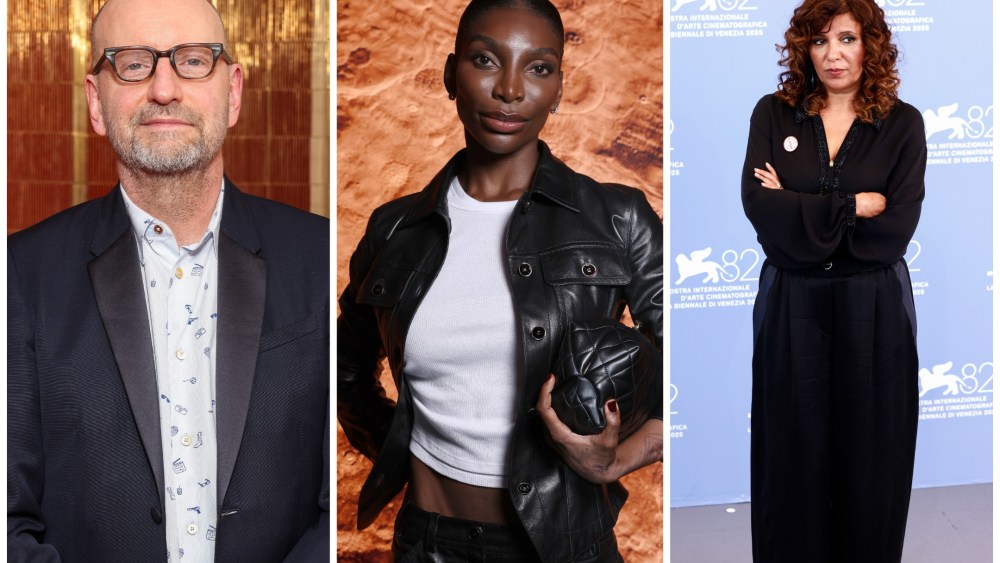The first Doha Film Festival opens on Thursday with a number of regional premieres, including the official Middle East premiere of Tunisian director Kauser Ben Hania’s politically charged drama “The Voice of Hind Rajab,” and Steven Soderbergh’s dark comedy “The Christophers,” starring the director and star Michaela Coel.
Rami Malek, the first actor of Egyptian descent to win the Best Actor Oscar (for Bohemian Rhapsody), will also be heading to the Qatari capital to attend the event, which aims to raise Qatar’s profile on the global film industry map.
It is significant that director Ben Hania’s moving drama – which tells the true story of a five-year-old Palestinian girl who was left behind in a car attacked by Israeli forces in the Gaza Strip and later found dead – launches into the region from Qatar, a key facilitator in ceasefire talks involving Israel and Hamas.
Equally relevant is the fact that “The Voice of Hind Rajab” previously opened the inaugural edition of the Gaza International Women’s Film Festival, which was held from October 26 to 31 in the rubble of the Palestinian city of Deir al-Balah, located in the heart of the Gaza Strip and about nine miles from Gaza City, marking the film’s de facto Middle East debut.
But Doha is where the film really takes off in the Arab world.
Ben Hania told Variety: “I’m very happy that the film is being released from Doha, where we wanted a (regional) premiere,” adding that when he told organizers in Doha that the “pop-up” festival in Gaza wanted to show it first, “they immediately said, ‘Yes, of course.'”
Other films featuring Palestine at the new Doha festival, which will run from November 20 to 28, include the competition film Once Upon a Time in Gaza, directed by Palestinian director duo Tarzan and Arab Nasser, which had its world premiere at Cannes, and the documentary With Hassan in Gaza, directed by Kamal Al-Jafari.
Outstanding titles in the competition include Iraqi filmmaker Hassan Hadi’s “President’s Cake.” The film tells the story of a young schoolgirl who is chosen to bake a celebratory dessert to commemorate the birthday of Saddam Hussein, Iraq’s representative at the Oscars. “Khartoum” is a powerful documentary about five residents forced to flee the conflict in Sudan’s capital that began at Sundance. and “Divine Comedy,” a dark comedy by Iranian director Ali Asghari about Iranian film censorship.
“The Christophers” will be one of the special screenings at Doha Fest, which will also screen Jim Sheridan’s legal drama “Re-Creation.” “Shoot the People,” Andy Mundy Castle’s documentary about Nigerian photographer and activist Misan Harriman. Yasser Ashour’s “My Story”, which depicts the life and political journey of Syrian actor and activist Jamal Soliman, will be honored at the festival’s opening ceremony. Then there was the world premiere of the Qatari thriller Sa3oud Wainah, directed by Mohamed Al-Ibrahim and produced by Katara Studio, a testament to Qatar’s filmmaking ambitions.
In addition to Soderbergh, Kohl and Malek, other celebrities scheduled to travel to the Qatari capital include Turkish television personalities Engin Altan Duzyatan (“Resurrection: Ertugrul”) and Hazar Kaya (“Midnight Perak”). Tunisian-Egyptian multihyphenate Dora Zarrouk (“The Walls,” “Zombies Goes Zombies”); and Palestinian stars Saleh Bakri and Hiam Abbas (“Succession”).
The new Doha Film Festival is run by the Doha Film Institute. This will transform DFI’s existing Ajal Film Festival, which specializes in youth and family films, into a more ambitious international event aimed at a wider audience. The new festival has four divisions: the International Feature Film Competition, the Short Film Competition, the Ajal Film Competition (judged by the festival’s own youth jury), and the Made in Qatar Competition, which is dedicated to projects made in Qatar, regardless of the origin of the director.
The Doha Film Festival has a total prize pool of more than $300,000, on par with Saudi Arabia’s more glamorous Red Sea Film Festival, which is held in Jeddah.
The event, which will be held from November 20 to 28, is the latest addition to the already crowded Arab film festival calendar during the fall/winter season. Cairo Fest runs from November 12th to 21st, and Marrakech Fest runs from November 28th to December. The 6th edition and the 5th edition of Red Sea are scheduled from December 4th to 13th.
Just as the small oil and gas-rich Arab nation is diversifying from the energy sector into culture, media and entertainment, as evidenced by its broadcaster Al Jazeera and the 2022 FIFA World Cup soccer tournament, DFI is steadily growing into a key cornerstone of the Middle East and North Africa (MENA) region’s film industry.
“As Qatar’s cultural presence expands and the regional film industry matures, we saw an opportunity to improve the festival’s content. Doha Film Festival (DFF) builds on the success of Ajal, but introduces broader industry engagement, global programming, and new avenues for cultural exchange,” DFI CEO Fatma Hassan Al Remaihi recently told Variety.
Doha Film Festival does not have a structured market. DFI already hosts a unique event called Qumra, an incubator and co-production market that supports the development of first and second films primarily by Arab directors. Qumra was conceived by DFI after the failure of the Tribeca Doha Film Festival, which ran from 2009 to 2012, and recently held its 11th edition. Kumra’s mentors this year included Johnnie To, Walter Salles, and Darius Khondji.
However, Doha Fest includes an industrial program provided by the Qatar Film Commission. Qatar Film Board is part of Media City Qatar Hub, an official body tasked with promoting the growth of the country’s entertainment industry. The program will include a series of panel discussions hosted by Mehdi Hassan, former MSNBC broadcast journalist and founder of media company Zeteo, and others. Rahma Zein, Egyptian journalist and Palestinian rights advocate; and Emmy-nominated journalist, sideline reporter and HBO correspondent Ahmed Shihab El-Din.
It will be interesting to see if and how this new festival succeeds in strengthening Qatar’s cultural soft power.

